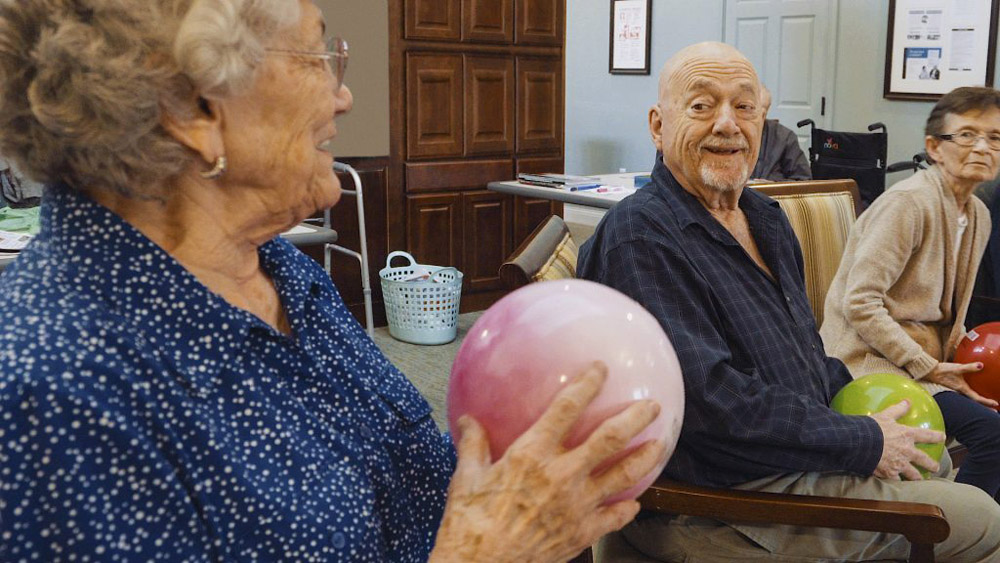Why Alzheimer’s Care Is Beneficial for Advanced Memory Loss
Wiki Article
Discover Compassionate Memory Care: Enhancing Lifestyle for Loved Ones
The trip of looking after a loved one with cognitive disabilities provides one-of-a-kind challenges that can exceptionally affect family members characteristics and emotional well-being. Caring memory care centers use an organized, encouraging environment developed to deal with these difficulties while boosting the top quality of life for homeowners. By concentrating on customized care and purposeful involvement, these centers not just boost those influenced by problems like Alzheimer's and mental deterioration yet also provide comfort for families. As we explore the important aspects of caring memory care, it ends up being clear that understanding these options can make a considerable difference in the lives of all involved.
Understanding Memory Care
Recognizing memory care involves acknowledging the specialized assistance and solutions developed to aid individuals with cognitive problems, such as Alzheimer's disease and other kinds of dementia. Memory care centers concentrate on producing a secure and structured atmosphere that advertises the well-being of locals while resolving their unique cognitive challenges.Key elements of memory care consist of educated staff that are knowledgeable regarding the intricacies of mental deterioration and related conditions. These specialists employ evidence-based practices to improve cognitive feature and keep dignity with embellished care strategies. The physical setting is also tailored to lessen complication and advertise knowledge, frequently featuring safe locations to avoid wandering. Memory Care Charlotte.Moreover, memory care emphasizes social engagement and meaningful tasks that promote cognitive capabilities and foster links amongst homeowners. This approach identifies the value of preserving social communications to battle isolation often experienced by people with memory loss.Families play an essential role in memory care, as their involvement assists develop an encouraging network that improves the lives of locals. By recognizing the specific nature of memory care, families can make enlightened choices to boost the lifestyle for their enjoyed ones dealing with cognitive impairmentsTrick Functions of Compassionate Care
Caring care in memory care settings is characterized by a holistic strategy that focuses on the psychological and mental well-being of residents. Trick attributes of this technique include individualized care strategies tailored to each resident's one-of-a-kind requirements, preferences, and life history. This customization promotes a feeling of identity and belonging, which is essential for those experiencing cognitive decline.Another important function is the presence of experienced personnel who are not just skilled in mental deterioration care however also thoughtful and compassionate. These caregivers involve in significant communications, utilizing techniques such as recognition therapy to attach with locals and reduce sensations of aggravation or anxiety.Additionally, thoughtful care atmospheres focus on sensory stimulation and healing activities that reverberate with locals' passions. This may consist of art therapy, music sessions, and memory activities, all made to enhance cognitive feature and emotional connection.Furthermore, household participation is encouraged, enabling loved ones to take part in care activities and sustain their relative's psychological needs. Eventually, the vital features of caring care develop an environment where citizens really feel safe, valued, and comprehended, substantially improving their lifestyle.Advantages for Residents and Families

Activities That Foster Interaction
Purposeful tasks play a necessary duty in fostering engagement among locals in memory care settings. These activities not only promote cognitive feature however likewise advertise social communication, emotional well-being, and a sense of purpose. Tailored programs that think about homeowners' rate of interests and abilities are necessary for taking full advantage of engagement and enjoyment.Creative pursuits, such as paint, crafting, or music treatment, encourage self-expression and can evoke pleasurable memories. Structured exercise sessions, consisting of chair yoga exercise or walking groups, enhance physical health and wellness while offering opportunities for socialization. Additionally, memory treatment, which includes talking about past experiences and noteworthy life occasions, can reinforce links between residents and caregivers.Incorporating interactive video games, problems, and even gardening can further boost cognitive interaction and foster team effort among homeowners. Consistently arranged group tasks, such as flick nights or themed parties, develop a sense of community, permitting citizens to build relationships and share experiences.Ultimately, the application of varied tasks tailored to specific choices is important in memory care. By advertising interaction through purposeful programming, centers can considerably enhance the lifestyle for locals, guaranteeing they feel valued and attached within their neighborhood.Picking the Right Memory Care Facility
Picking a memory care facility entails careful factor to consider of various variables that impact the health of residents. Begin by examining the facility's general setting, making sure it is secure, welcoming, and created to reduce confusion. Seek spaces that motivate social communication while offering personal privacy for personal reflection.Next, evaluate the credentials and training of the staff. Caring for people with memory problems requires specialized understanding. Validate that employee get recurring training in dementia care and employ caring interaction techniques.Additionally, consider the range of services used, such as customized care plans, therapeutic activities, and support for member of the family. A center that stresses holistic care can significantly improve the lifestyle for residents.Visit possible centers to observe communications in between staff and residents, and ask regarding their method to involving those with memory difficulties. Inspect testimonials and look for referrals from medical care specialists or neighborhood assistance groups.Lastly, take into consideration the center's area and access for family members visits, as regular contact can improve residents' psychological health. By taking these variables right into account, you can make an educated choice that finest supports your loved one's needs.Frequently Asked Inquiries
What Credentials Do Memory Care Team Normally Possess?
Memory care staff generally hold qualifications that consist of specialized training in mental deterioration and Alzheimer's care, along with accreditations in emergency treatment and CPR. Several have histories in nursing or community service, offering them with necessary skills in patient analysis and psychological support. Memory Care. In addition, recurring education in behavior administration techniques and interaction methods is typical, ensuring team remain adept at attending to the distinct demands see this page of individuals with cognitive impairments while cultivating a supportive settingExactly How Can Family Members Join Their Family member's Care?

What Is the Expense Variety for Memory Care Solutions?
The expense range for memory care services can differ substantially based on aspects such as area, facility features, and degree of care required. Usually, families may expect to pay between $4,000 and $8,000 each month. Additional solutions, specialized programs, and private holiday accommodations can further affect rates. Alzheimer’s Care. It is advisable for families to thoroughly research and check out facilities to recognize what is consisted of in the charges and explore monetary help choices availableExist Particular Dietary Options Available for Residents?
Yes, several memory care centers offer customized dietary alternatives to satisfy the details nutritional needs of locals. These choices typically consider various nutritional limitations, such as diabetes, heart health and wellness, or allergies. Facilities commonly employ accredited dietitians to create meal strategies that promote general health while thinking about specific preferences. Furthermore, member of the family are normally encouraged to take part in conversations regarding dietary selections to guarantee that their liked ones' preferences and needs are respected.Exactly How Are Emergency Situations Handled in Memory Care Facilities?
Emergencies in memory care centers are taken care of through developed methods designed to guarantee resident security and speedy feedback. Staff are learnt emergency treatments, consisting of initial aid and evacuation plans - Dementia Care Charlotte. Facilities conduct routine drills to plan for various situations, such as medical emergency situations, fires, or all-natural calamities. Additionally, communication systems are in location to sharp team and emergency situation services quickly, making sure that citizens obtain prompt attention and care during crucial circumstancesReport this wiki page